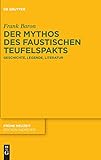Der Mythos des faustischen Teufelspakts : Geschichte, Legende, Literatur / Frank Baron.
Material type: TextSeries: Frühe Neuzeit : Studien und Dokumente zur deutschen Literatur und Kultur im europäischen Kontext ; 223Publisher: Berlin ; Boston : De Gruyter, [2019]Copyright date: ©2019Description: 1 online resource (VIII, 317 p.)Content type:
TextSeries: Frühe Neuzeit : Studien und Dokumente zur deutschen Literatur und Kultur im europäischen Kontext ; 223Publisher: Berlin ; Boston : De Gruyter, [2019]Copyright date: ©2019Description: 1 online resource (VIII, 317 p.)Content type: - 9783110612899
- 9783110613056
- 9783110613070
- 809.93351 23
- Internet Access AEU
- online - DeGruyter
- Issued also in print.
| Item type | Current library | Call number | URL | Status | Notes | Barcode | |
|---|---|---|---|---|---|---|---|
 eBook
eBook
|
Biblioteca "Angelicum" Pont. Univ. S.Tommaso d'Aquino Nuvola online | online - DeGruyter (Browse shelf(Opens below)) | Online access | Not for loan (Accesso limitato) | Accesso per gli utenti autorizzati / Access for authorized users | (dgr)9783110613070 |
Browsing Biblioteca "Angelicum" Pont. Univ. S.Tommaso d'Aquino shelves, Shelving location: Nuvola online Close shelf browser (Hides shelf browser)
Frontmatter -- Vorwort -- Inhalt -- Einleitung -- Geschichte -- I. Der Historische Doctor Faustus -- II. Ärzte Gegen Faustus: Philipp Begardi— Conrad Gessner—Johannes Weyer 10.1515/9783110613070-003 -- Legende -- III. Faustus In Wittenberg: Martin Luther— Philipp Melanchthon Und Johannes Gast— Johannes Manlius -- IV. Hexenprozesse Und Die Vorbereitung Des Faustischen Teufelspakts: Wittenberg Und Berlin -- V. Der Prozess Gegen Dietrich Flade -- VI. Konvergenz: Faustus-Vita Und Teufelspakt -- VII. Das Faustbuch: Evolution Der Struktur -- VIII. Manipulationen An Witekinds Christlich Bedencken -- IX. Das Neue Im Spies-Faustbuch -- X. Begleiterscheinungen: Inversion Und Mythische Identifikation -- XI. Das Unbekannte Faustbuch Der C-Reihe (1587): Ein Raubdruck Mit Sechs „Erfurter“ Geschichten -- Literatur -- XII. Der Faustische Teufelspakt In England Und Deutschland: Marlowe, Lessing Und Goethe -- Texte -- Der Prozess Gegen Lippold (1573) -- Die Englische Faust-Ballade -- Literaturverzeichnis -- Personenregister
restricted access online access with authorization star
http://purl.org/coar/access_right/c_16ec
Katalysator der Faust-Fabel ist ein Teufelspakt, Erbe der Hexenverfolgung. Diese Vorstellung bot dem anonymen Autor des Faust-Buches von 1587 einen geeigneten Plot. Trotz des Meisterwerks, das Chr. Marlowe auf Grundlage der Übersetzung geschaffen hatte, hielt man den Teufelspakt in der Aufklärung für Aberglauben. Lessing und Goethe schien es notwendig, eine radikale Umformung des Mythos vorzunehmen.
The tale of Faust is catalyzed by a deal with the devil, a legacy of witch persecution. The anonymous author of the Faust Book of 1587 used such a deal as a plot device. Despite Christopher Marlowe’s masterpiece, based on that translation, the Enlightenment considered the pact with the devil a superstition. Lessing and Goethe thought it necessary to reshape the myth radically.
Issued also in print.
Mode of access: Internet via World Wide Web.
In German.
Description based on online resource; title from PDF title page (publisher's Web site, viewed 25. Jun 2024)









